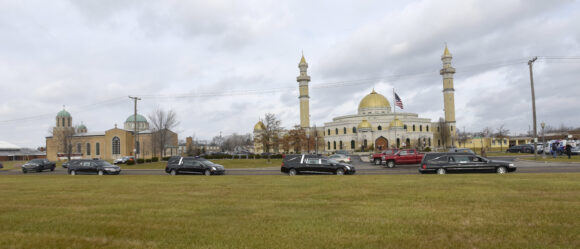A trial court said the insurance policy was ambiguous, allowing a commercial umbrella policy to supplement coverage in the deaths of five people killed by a drunken driver in 2019. But the Kentucky Supreme Court this week found that the Grange Insurance Co. exclusion was clear enough, limiting the extra payout in the liquor liability coverage lawsuit.
“Our longstanding precedent on the interpretation of insurance policies is clear. This Court has long held that unambiguous contracts are enforced as written,” the justices wrote in their Sept. 18 opinion.
After driver Joey Lee Bailey was allegedly overserved at two establishments in Georgetown, Kentucky, in January 2019, he drove on the wrong side of Interstate 75 and slammed into a vehicle, killing himself and all five members of the Abbas family, the court explained. The tragedy made national news reports, which noted the family members were on their way from a DisneyWorld vacation, en route to their home in Michigan.
The restaurant known as Roosters held a businessowners policy and commercial umbrella policy with Ohio-based Grange Insurance. The businessowners policy provided a $1 million limit for bodily injury and property damage arising from the serving of alcoholic beverages. That coverage was not in dispute. But after the estate of the deceased family sued the restaurants, Roosers asked the circuit court in Fayette to declare that the umbrella policy also provided coverage.
 The circuit judge found that an exclusion in the umbrella policy, known as CU 47, was ambiguous, and the judge granted summary judgment in favor of Roosters.
The circuit judge found that an exclusion in the umbrella policy, known as CU 47, was ambiguous, and the judge granted summary judgment in favor of Roosters.
“Though the BOP and the CUP are two separate policies, the circuit court reasoned that the purpose of an umbrella policy is to supplement the underlying policy when the underlying policy is exhausted,” the Supreme Court explained. But the lower court’s written judgment did not identify any specific ambiguous language.
Grange Insurance appealed. The Kentucky Court of Appeals in 2023 overturned the trial court and decided that the CU 47 exclusion was not, in fact, ambiguously worded. The CU 47 endorsement replaced the entirety of a section the policy, intentionally deleting the paragraphs which otherwise would have provided coverage, the appeals court noted.
Roosters asked the high court to review. The justices agreed with the appellate judges, finding that the exclusion’s wording is clear. Per court rulings from the 1990s, insurance contract law dictates that when an endorsement deletes language from a policy, “a court must not consider the deleted language in its interpretation of the remaining agreement.”
The restaurant owners had argued that the CU 47 exclusion did not explicitly state that it replaced the entirety of the original liquor liability exclusion, thus allowing exceptions and extending extra coverage. This is the section of the original exclusion that Roosters’ attorneys said should still apply:
“This exclusion does not apply to the extent that valid ‘underlying insurance’ for the liquor liability risks described above exists or would have existed but for the exhaustion of underlying limits for bodily injury’ and ‘property damage'”.
But the justices said the CU 47 exclusion section plainly states that the exclusion in the policy “is replaced by” the new exclusion’s wording, which cleary notes that liability from injury that resulted from furnishing alcohol to an intoxicated person is not covered by the umbrella policy.
“There is nothing left to compare,” the high court opinion noted.
Ambiguity in property and liability insurance policies has continued to be a turning point in claims and coverage legal disputes, resulting in multiple appeals across the country each year. In the last 10 years, at least 125 federal appeals court cases have addressed ambiguous policy language, according to Google Scholar.
But in this case, the “is replaced by” wording makes it clear that Grange’s policy language is not confusing, the Kentucky justices said.
Photo: Hearses pass in front of the Islamic Center of America in Dearborn, Michigan, in 2019 after funeral services for five members of the Abbas family. (Todd McInturf/Detroit News via AP)
Topics Kentucky
Was this article valuable?
Here are more articles you may enjoy.



 Florida’s Commercial Clearinghouse Bill Stirring Up Concerns for Brokers, Regulators
Florida’s Commercial Clearinghouse Bill Stirring Up Concerns for Brokers, Regulators  A 10-Year Wait for Autonomous Vehicles to Impact Insurers, Says Fitch
A 10-Year Wait for Autonomous Vehicles to Impact Insurers, Says Fitch  The $10 Trillion Fight: Modeling a US-China War Over Taiwan
The $10 Trillion Fight: Modeling a US-China War Over Taiwan  Florida Insurance Costs 14.5% Lower Than Without Reforms, Report Finds
Florida Insurance Costs 14.5% Lower Than Without Reforms, Report Finds 


